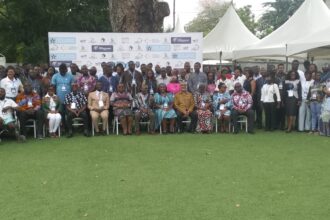To drive greater awareness around breast cancer, empower and support breast cancer patients in Nigeria and Ghana, Pfizer along with medical professionals held a media roundtable. Pfizer held the media roundtable to mark Breast Cancer Awareness Month and Metastatic Breast Cancer Day that falls on the 13th of October.
The roundtable was attended by two reputable medical professionals from Nigeria and Ghana, and addressed local metastatic breast cancer incidence, how it is diagnosed, who is at risk, steps to take to fight breast cancer and set the right expectation, as well as latest treatment advances.
The participants stressed that although great progress has been made in the treatment and care of breast cancer, there is still a lot more work to be done. They agreed this is especially true within underserved and hard-to-reach communities in places, too often, experience critical gaps in their care. Timely access, affordable treatment options and expansion of resources and programs that address current disparities across age, race, gender, and location can remove barriers that stand in the way of the most vulnerable people with breast cancer.
According to the Globocan 2020 study, breast cancer is the commonest cancer in women in Nigeria and Ghana and accounts for 22.7% of new cancer cases in Nigeria and 18.7% of new ones in Ghana respectively in 2020. Moreover, it impacts over 247,000 people across Africa and the Middle East (AfME). Early-stage breast cancer is when cancer cells have not spread beyond the breast or axillary lymph nodes. However, in AfME, 50-60% of breast cancer patients are in locally advanced or advanced stages at initial diagnosis. Metastatic breast cancer (MBC) is the most advanced stage of breast cancer, and it occurs when cancer spreads to other parts of the body, such as the lung, brain, liver, and bones.
Kodjo Soroh, Medical Director, Sub-Saharan Africa, Pfizer, commented, “At Pfizer, we remain committed to improving patients’ lives and supporting them at each step of their breast cancer experience. Across the region, patients are diagnosed with late or advanced-stage cancer at a higher incidence rate than other regions globally. There is a distinct need for more awareness campaigns to regularly encourage patients to check themselves for breast cancer and better understand the disease. Moreover, over the past decade, improved diagnostics, and newer treatment options for late-stage breast cancer, including those with different gene abnormalities, offer new horizons and hope for these patients.”
He added: “We feel a deep obligation to advocate for people with breast cancer at every stage of their disease. Through our partnerships and programs, we continue to create access to better screening services, clinical trials, treatment options and extended support to mental health and financial resources more so during life’s unexpected events, such as COVID-19.”
Dr. Hannah Naa Gogwe Ayettey Anie, National Radiotherapy Oncology and Nuclear Medicine Centre, Ghana pointed out that Most women diagnosed with breast cancer do not have any signs or symptoms of the disease. However, there are changes in the breast that some women do not notice. Therefore, it is hard to overestimate the importance of conducting self-examination and going for regular check-ups. While each case is unique, age, certain genetic mutations (like BRCA1 and BRCA2), getting periods before age 12 or starting menopause after age 55, having dense breasts, and family history are all known risk factors. With better awareness, prevention, treatment, and access to diagnostics, early detection could save between 2.4 and 3.7 million lives each year globally.”
On her part, Prof. Ifeoma Joy Okoye, Professor of Radiology, College of Medicine, University of Nigeria Nsukka, Nigeria, added, “It is crucial for patients who have been diagnosed with breast cancer or even metastatic breast cancer to have the right information and expectations. It is our duty to encourage them to have open conversations with their healthcare teams to understand how they can be supported but also how they can participate in their own care – taking an active role in their treatment can help them feel empowered in making the best decisions for themselves.”
In response to such a high incidence of late-stage diagnosis of breast cancer across AfME, Pfizer is joining forces with Breast Without Spot and Breast Cancer International to disseminate educational content designed to encourage and empower individuals, patients, and families to get checked for breast cancer, better understand the disease and have the right expectations and act against it.
According to WHO, breast cancer is the most common invasive cancer in women worldwide, with more than 2 million women impacted annually. Most women diagnosed with breast cancer do not have any signs or symptoms of the disease. However, there are sometimes changes in the breast that a woman may notice. While rare, men can also be diagnosed with breast cancer. For men, the lifetime risk of breast cancer is about 1 in 833.
Source: Publicagendagh.com














